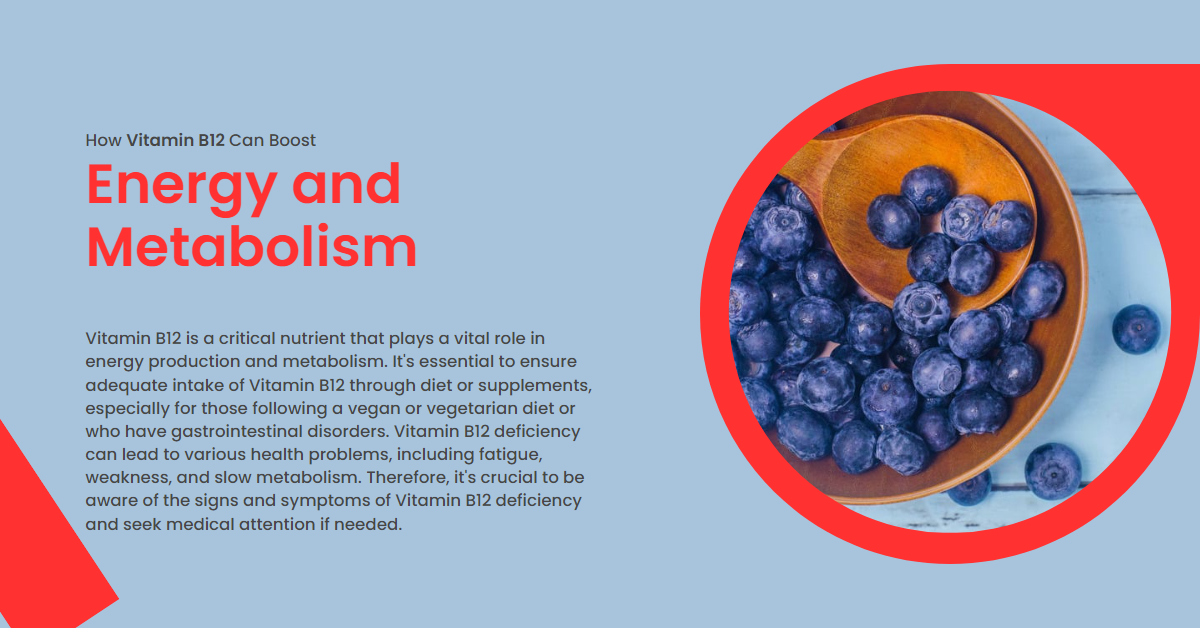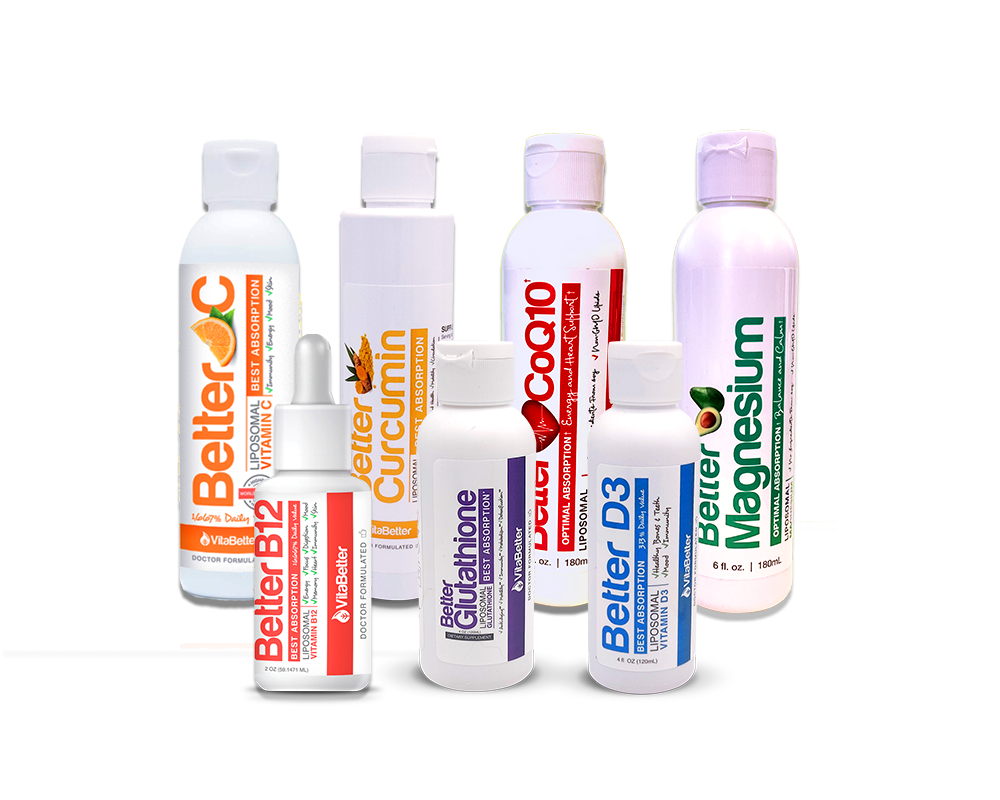Vitamin B12 is a critical nutrient that plays a vital role in energy production and metabolism. It’s essential to ensure adequate intake of Vitamin B12 through diet or supplements, especially for those following a vegan or vegetarian diet or who have gastrointestinal disorders. Vitamin B12 deficiency can lead to various health problems, including fatigue, weakness, and slow metabolism. Therefore, it’s crucial to be aware of the signs and symptoms of Vitamin B12 deficiency and seek medical attention if needed.
Key Highlights
- Vitamin B12 is an essential nutrient that plays a vital role in energy production and metabolism. It helps convert the food we eat into glucose, which is used as fuel by our body. Inadequate levels of Vitamin B12 can lead to fatigue and weakness, making it essential to ensure adequate intake of this nutrient.
- Vitamin B12 is naturally found in animal-based foods such as meat, fish, dairy, and eggs. However, those following a vegan or vegetarian diet may need to supplement with Vitamin B12 to prevent deficiency since plant-based foods do not contain significant amounts of this nutrient.
- While Vitamin B12 is essential for optimal health, it’s just one factor that contributes to overall well-being. Maintaining a healthy and balanced diet, regular exercise, and getting adequate sleep and hydration are also crucial for optimal health. By incorporating these healthy habits into your lifestyle and ensuring adequate intake of Vitamin B12, you can boost your energy and metabolism and achieve optimal health and well-being.
While Vitamin B12 is essential for optimal health, it’s just one factor that contributes to overall well-being. Maintaining a healthy and balanced diet, regular exercise, and getting adequate sleep and hydration are also crucial for optimal health. By incorporating these healthy habits into your lifestyle and ensuring adequate intake of Vitamin B12, you can boost your energy and metabolism, prevent health problems, and achieve optimal health and well-being.
What is Vitamin B12?
Vitamin B12, also known as cobalamin, is a water-soluble vitamin that plays a vital role in many bodily functions, including red blood cell formation, DNA synthesis, and nerve function. It’s not produced by the human body and must be obtained through diet or supplements.
Vitamin B12 is naturally found in animal-based foods such as meat, fish, dairy, and eggs. However, those following a vegan or vegetarian diet may be at risk of Vitamin B12 deficiency since plant-based foods do not contain significant amounts of this nutrient. Vitamin B12 deficiency can lead to various health problems, including anemia, fatigue, weakness, and nerve damage.
How does Vitamin B12 affect energy levels?
Vitamin B12 plays a vital role in energy production by converting the food we eat into glucose, which is used by our bodies as fuel. Glucose is essential for providing energy to our muscles, brain, and other organs.
When we consume food, our digestive system breaks down the nutrients, including carbohydrates, fats, and proteins, into smaller components. These components are then transported to our cells, where they are converted into energy. However, this process cannot occur without enough Vitamin B12, which acts as a cofactor for enzymes involved in energy production.
Inadequate levels of Vitamin B12 can lead to fatigue and weakness since our body is unable to produce sufficient energy to meet our daily demands. Therefore, it’s essential to ensure adequate intake of Vitamin B12 to maintain optimal energy levels and prevent fatigue.
How does Vitamin B12 affect metabolism?
Metabolism refers to the chemical processes that occur within our bodies to maintain life. It involves the breakdown of food and the conversion of nutrients into energy and other essential compounds needed for our body’s functions.
Vitamin B12 plays a crucial role in metabolism by helping to convert fatty acids and amino acids into energy. It’s also involved in the synthesis of DNA, which is essential for cell growth and repair.
Inadequate levels of Vitamin B12 can lead to a slower metabolism, which may result in weight gain and other health problems. Therefore, ensuring adequate intake of Vitamin B12 can help boost metabolism, promote weight loss, and improve overall health.
How much Vitamin B12 do you need?
The recommended daily intake of Vitamin B12 for adults is 2.4 micrograms per day. However, this may vary depending on individual factors such as age, sex, and health status.
Those following a vegan or vegetarian diet may need to supplement with Vitamin B12 since plant-based foods do not contain significant amounts of this nutrient. Older adults and those with gastrointestinal disorders may also require higher doses of Vitamin B12 since their bodies may have difficulty absorbing this vitamin.
What are the best food sources of Vitamin B12?
As mentioned earlier, Vitamin B12 is naturally found in animal-based foods such as meat, fish, dairy, and eggs. The following are some of the best food sources of Vitamin B12:
- Beef liver
- Clams
- Salmon
- Tuna
- Milk
- Cheese
- Eggs
If you’re following a vegan or vegetarian diet, you can obtain Vitamin B12 from fortified cereals, plant-based milk, and nutritional yeast.
Vitamin B12 is an essential nutrient that plays a crucial role in many bodily functions, including energy production and metabolism. It’s not produced by the human body and must be obtained through diet or supplements. Vitamin B12 helps to convert food into energy and is involved in many metabolic processes. Inadequate levels of Vitamin B12 can lead to fatigue, weakness, slow metabolism, and other health problems. Therefore, it’s essential to ensure adequate intake of Vitamin B12 to maintain optimal health and well-being.
The best food sources of Vitamin B12 are animal-based foods such as meat, fish, dairy, and eggs. However, those following a vegan or vegetarian diet may need to supplement with Vitamin B12 to prevent deficiency. It’s important to consult with a healthcare professional before starting any new supplement regimen.
In conclusion, Vitamin B12 is a crucial nutrient that plays a significant role in maintaining optimal health and well-being. By ensuring adequate intake of Vitamin B12 through diet or supplements, you can boost your energy levels, improve metabolism, and prevent various health problems. Remember to consume a balanced and varied diet that includes Vitamin B12-rich foods to support your body’s needs.
Additionally, it’s essential to be aware of the signs and symptoms of Vitamin B12 deficiency, which include fatigue, weakness, numbness or tingling in the hands and feet, difficulty walking, memory problems, and depression. If you experience any of these symptoms, it’s crucial to seek medical attention to determine if you have a Vitamin B12 deficiency.
Finally, it’s worth noting that while Vitamin B12 plays a crucial role in energy production and metabolism, it’s just one factor that contributes to overall health and well-being. Maintaining a healthy and balanced diet, regular exercise, and getting adequate sleep and hydration are also essential for optimal health. By incorporating these healthy habits into your lifestyle and ensuring adequate intake of Vitamin B12, you can boost your energy and metabolism and achieve optimal health and well-being.
References
Office of Dietary Supplements. (2020). Vitamin B12. Retrieved from https://ods.od.nih.gov/factsheets/VitaminB12-Consumer/
National Institutes of Health. (2021). Vitamin B12. Retrieved from https://ods.od.nih.gov/factsheets/VitaminB12-HealthProfessional/
University of Michigan Health System. (2020). Vitamin B12. Retrieved from https://www.uofmhealth.org/health-library/hn-2908002
National Health Service. (2018). Vitamins and Minerals – B vitamins and folic acid. Retrieved from https://www.nhs.uk/conditions/vitamins-and-minerals/vitamin-b/
Institute of Medicine (US) Standing Committee on the Scientific Evaluation of Dietary Reference Intakes and its Panel on Folate, Other B Vitamins, and Choline. (1998). Dietary Reference Intakes for Thiamin, Riboflavin, Niacin, Vitamin B6, Folate, Vitamin B12, Pantothenic Acid, Biotin, and Choline. Washington (DC): National Academies Press (US). Retrieved from https://www.ncbi.nlm.nih.gov/books/NBK114310/
O’Leary, F., & Samman, S. (2010). Vitamin B12 in health and disease. Nutrients, 2(3), 299-316. doi:10.3390/nu2030299
Guezennec, C. Y., & Abdelmalki, A. (2002). Effects of vitamin B12 on performance and circadian rhythm in normal subjects. Neuropsychobiology, 45(4), 186-191. doi:10.1159/000063518
Pawlak, R., Parrott, S. J., Raj, S., Cullum-Dugan, D., & Lucus, D. (2013). How prevalent is vitamin B(12) deficiency among vegetarians? Nutrition Reviews, 71(2), 110-117. doi:10.1111/nure.12001
Scott, J. M. (2003). Folate and vitamin B12. Proceedings of the Nutrition Society, 62(3), 441-444. doi:10.1079/PNS2003254
Dror, D. K., & Allen, L. H. (2008). Effect of vitamin B12 deficiency on neurodevelopment in infants: current knowledge and possible mechanisms. Nutrition Reviews, 66(5), 250-255. doi:10.1111/j.1753-4887.2008.00032.x


